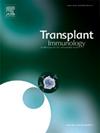Assessing the influence of isolation techniques on NK cell transcriptomic profiles
IF 1.4
4区 医学
Q4 IMMUNOLOGY
引用次数: 0
Abstract
Natural Killer (NK) cells are vital components of the innate immune system, playing a crucial role in defending the body against tumors and virally infected cells. While various methods exist for their isolation, the profound impact of these techniques on NK cell biology remains poorly characterized.This study presents a comprehensive analysis of the transcriptomic profiles of NK cells isolated using different positive selection methods; anti-CD56, anti-CD7 (with two distinct lineage depletion protocols), and a combination of anti-CD16 and anti-CD56 antibodies, compared to negative selection using immunomagnetic beads. Our integrated analysis of RNA-Seq datasets revealed that the isolation method is a dominant source of transcriptomic variation, accounting for 68.6 % of the total dataset variance, with technical factors being inextricably confounded with this biological signal. We identified extensive method-specific transcriptional signatures, with minimal overlap (<0.1 %) in differentially expressed genes (DEGs) across techniques. Functional enrichment analysis demonstrated that these signatures correspond to starkly different functional states: anti-CD16/anti-CD56 selection enriched for a highly activated, cytotoxically competent NK cell population with upregulated pathways in cytotoxicity and immune surveillance, while one anti-CD7-based method captured NK cells in a suppressed state, showing significant downregulation of lymphocyte activation and cytotoxicity pathways. Marker expression analysis further revealed extreme inter-study heterogeneity, with fold-changes in key cytotoxic genes exceeding 70,000-fold between methods. These findings highlight that the choice of isolation technique is not neutral but fundamentally determines the transcriptional and functional identity of the studied NK cell population. Our results highlight the critical importance of methodological standardization in NK cell research and provide essential guidance for selecting isolation strategies tailored to specific research or therapeutic applications.

评估分离技术对NK细胞转录组谱的影响。
自然杀伤细胞(NK)是先天免疫系统的重要组成部分,在保护身体免受肿瘤和病毒感染细胞的侵害方面起着至关重要的作用。虽然存在各种方法来分离NK细胞,但这些技术对NK细胞生物学的深远影响仍然缺乏表征。本研究对使用不同阳性选择方法分离的NK细胞的转录组学特征进行了全面分析;与使用免疫磁珠的阴性选择相比,抗cd56,抗cd7(有两种不同的谱系耗尽方案),以及抗cd16和抗cd56抗体的组合。我们对RNA-Seq数据集的综合分析表明,分离方法是转录组变异的主要来源,占总数据集变异的68.6% %,技术因素与这种生物信号不可避免地混淆在一起。我们发现了广泛的方法特异性转录特征,重叠最小(
本文章由计算机程序翻译,如有差异,请以英文原文为准。
求助全文
约1分钟内获得全文
求助全文
来源期刊

Transplant immunology
医学-免疫学
CiteScore
2.10
自引率
13.30%
发文量
198
审稿时长
48 days
期刊介绍:
Transplant Immunology will publish up-to-date information on all aspects of the broad field it encompasses. The journal will be directed at (basic) scientists, tissue typers, transplant physicians and surgeons, and research and data on all immunological aspects of organ-, tissue- and (haematopoietic) stem cell transplantation are of potential interest to the readers of Transplant Immunology. Original papers, Review articles and Hypotheses will be considered for publication and submitted manuscripts will be rapidly peer-reviewed and published. They will be judged on the basis of scientific merit, originality, timeliness and quality.
 求助内容:
求助内容: 应助结果提醒方式:
应助结果提醒方式:


